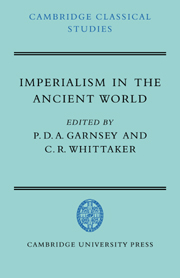Book contents
- Frontmatter
- Contents
- List of figures
- Preface
- 1 INTRODUCTION
- 2 IMPERIALISM AND EMPIRE IN NEW KINGDOM EGYPT
- 3 CARTHAGINIAN IMPERIALISM IN THE FIFTH AND FOURTH CENTURIES
- 4 SPARTAN IMPERIALISM?
- 5 THE FIFTH-CENTURY ATHENIAN EMPIRE: A BALANCE SHEET
- 6 ATHENS IN THE FOURTH CENTURY
- 7 THE ANTIGONIDS AND THE GREEK STATES, 276–196 B.C.
- 8 LAUS IMPERII
- 9 GREEK INTELLECTUALS AND THE ROMAN ARISTOCRACY IN THE FIRST CENTURY B.C.
- 10 THE BENEFICIAL IDEOLOGY
- 11 ROME's AFRICAN EMPIRE UNDER THE PRINCIPATE
- 12 JEWISH ATTITUDES TO THE ROMAN EMPIRE
- Notes
- Bibliography
- Index
5 - THE FIFTH-CENTURY ATHENIAN EMPIRE: A BALANCE SHEET
Published online by Cambridge University Press: 05 June 2014
- Frontmatter
- Contents
- List of figures
- Preface
- 1 INTRODUCTION
- 2 IMPERIALISM AND EMPIRE IN NEW KINGDOM EGYPT
- 3 CARTHAGINIAN IMPERIALISM IN THE FIFTH AND FOURTH CENTURIES
- 4 SPARTAN IMPERIALISM?
- 5 THE FIFTH-CENTURY ATHENIAN EMPIRE: A BALANCE SHEET
- 6 ATHENS IN THE FOURTH CENTURY
- 7 THE ANTIGONIDS AND THE GREEK STATES, 276–196 B.C.
- 8 LAUS IMPERII
- 9 GREEK INTELLECTUALS AND THE ROMAN ARISTOCRACY IN THE FIRST CENTURY B.C.
- 10 THE BENEFICIAL IDEOLOGY
- 11 ROME's AFRICAN EMPIRE UNDER THE PRINCIPATE
- 12 JEWISH ATTITUDES TO THE ROMAN EMPIRE
- Notes
- Bibliography
- Index
Summary
‘Every doctrine of imperialism devised by men is a consequence of their second thoughts. But empires are not built by men troubled by second thoughts.’
I start with that aphoristic formulation, the truth of which has been demonstrated in the study of modern imperialisms, as an antidote to the familiar practice of beginning a discussion of the Athenian empire with aims and motives and quickly sliding over to attitudes and even theory, thereby implying that the men who created and extended the empire also began with a defined imperialist programme and theories of imperialism. An outstanding current example of the procedure I have in mind is the attempt to date a number of Athenian laws and decrees (or to support a proposed date) by what may be called their imperialist tone. If they are ‘harsh’, it is argued, they smack of Cleon and should be dated in the 420s B.C., and not in the time of the more ‘moderate’ Periclean leadership, the 440s or 430s. Insofar as the argument is not circular, it implies the existence of an identifiable programme of imperialism, or rather of both successive and conflicting programmes, and that requires demonstration, not assumption.
A second source of confusion is the unavoidable ambiguity of the word ‘empire’. Stemming from the Latin imperium, ‘empire’ becomes entangled with the word ‘emperor’, and much of the extensive discussion throughout the Middle Ages and on into modern times ends in a tautological cul-de-sac: an empire is the territory ruled by an emperor.
- Type
- Chapter
- Information
- Imperialism in the Ancient WorldThe Cambridge University Research Seminar in Ancient History, pp. 103 - 126Publisher: Cambridge University PressPrint publication year: 1979
- 4
- Cited by

